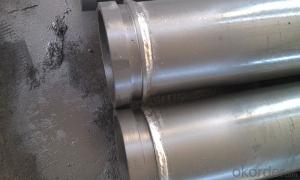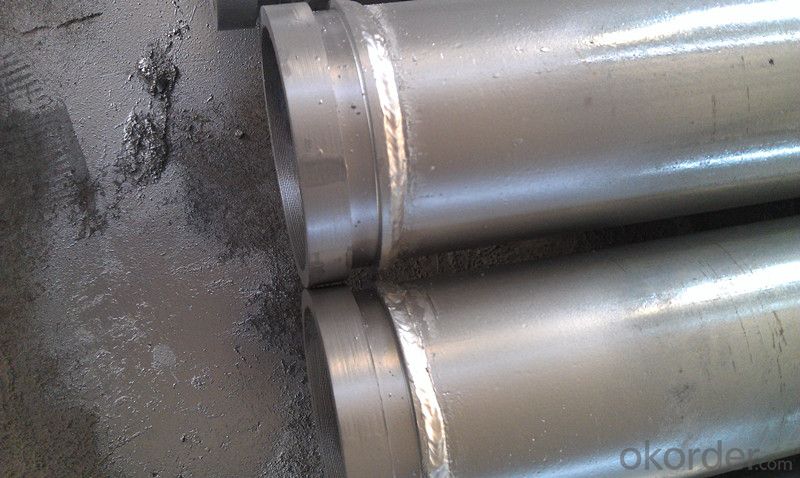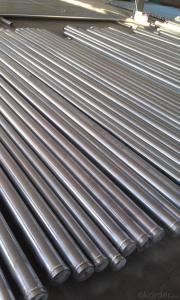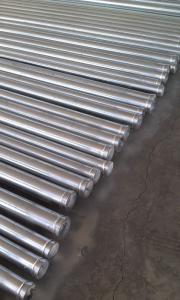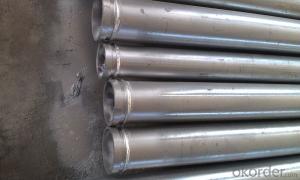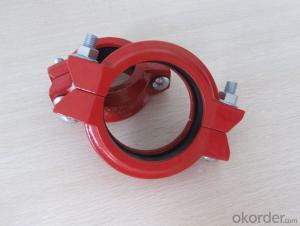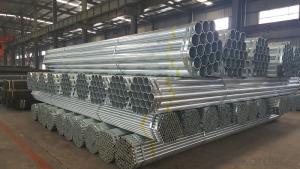Victaulic Shouldered Grooved Pipe For Mining and Tunnel
- Loading Port:
- China Main Port
- Payment Terms:
- TT OR LC
- Min Order Qty:
- -
- Supply Capability:
- -
OKorder Service Pledge
OKorder Financial Service
You Might Also Like
Product Name | Shouldered Grooved pipe |
Outside Diameter(mm) | 60.3mm-425mm |
Wall thickness(mm) | 2mm-20mm |
Certification | FM/UL; SGS/BV |
Standard | 1.ASTM A106/A53 GR.A; ASTM A106/A53 GR.B; ASTM A53/A106 GR.C 2.APL 5L GR.B, API 5CT J55, K55, N80 3.ASTM, BS,DIN, EN |
Grade | A, B, C, ST33, ST37, ST35.8, ST45-8, ST45-4, ST52 |
Place of Origin | Hebei Cina |
Face finished | 1.Manual polished 2.mechanical polished 3.black paint on the face 4.Shoulder Grooved on both ends 5.Galvanized or Colour Painting |
Export | Europe, South America, the Middle East, Africa, Asia and other countries and regions, well received by consumers! |
Process Method | 1.Cold Drawn 2.Cold rolled 3.Hot rolled 4. Hot expanded |
Application | Tube with hollow cross-section, a large number of channels for transporting fluids, such as the transportation of oil, natural gas, gas, water and some solid materials, pipes, etc.. |
Package | 1.Inner Packing:Caps at both ends, steel strong trips on every bundle 2.Outer Packing:Standard export package or as per clients' requirements |
- Q: How are steel pipes insulated for thermal applications?
- Steel pipes are commonly insulated for thermal applications using various materials such as fiberglass, mineral wool, or foam insulation. These insulating materials are typically wrapped around the steel pipes to create a protective barrier that reduces heat transfer. Additionally, a vapor barrier may be installed to prevent moisture condensation. This insulation helps to maintain the desired temperature of the fluid or gas being transported through the pipes and prevents energy loss.
- Q: What is the thermal expansion coefficient of steel pipes?
- The thermal expansion coefficient of steel pipes varies based on the particular steel type and the temperature range in which the expansion is measured. On average, the thermal expansion coefficient of steel pipes is between 10-14 x 10^-6 per degree Celsius (10-14 μm/m°C). Thus, for each degree Celsius rise in temperature, the length of a steel pipe will roughly increase by 10-14 μm per meter. It is vital to acknowledge that this value is an average and may slightly differ based on the specific composition and treatment of the steel employed in the pipe.
- Q: Can steel pipes be used for underground heat exchange systems?
- Yes, steel pipes can be used for underground heat exchange systems. Steel pipes are commonly used for this purpose due to their durability and resistance to corrosion. They can effectively transport and exchange heat in underground systems, making them a suitable choice for such applications.
- Q: Are there specifications for scaffold steel pipe with 48mm * 3.2mm?
- Scaffold tubes are our name for materials used to build scaffolding, because most scaffolding uses tubular bamboo or steel tubing. Bamboo and other bamboo is for a long time in the use of the scaffolding tube, but due to lack of safety and durability, now only in rural and urban area construction is lagging behind some of the home building small building has been used. The modernization construction, the most commonly used type of scaffolding pipe is steel pipe, the scaffolding should not only meet the demand of workers, but also to meet the characteristics of scaffolding firm and durable, so tough hard steel is the best choice. The selected steel pipe generally requires smooth surface, no cracks, no bending, no rust, and meet the relevant national standards.
- Q: What are the advantages of using steel pipes in marine applications?
- There are several advantages of using steel pipes in marine applications. Firstly, steel pipes are highly resistant to corrosion, making them suitable for prolonged exposure to saltwater and other harsh marine environments. Secondly, steel pipes have high strength and durability, allowing them to withstand extreme pressures and impacts commonly encountered in marine operations. Additionally, steel pipes have excellent thermal conductivity, making them ideal for transporting fluids at high temperatures. Lastly, steel pipes are readily available and can be easily fabricated and installed, ensuring efficiency and cost-effectiveness in marine applications.
- Q: What is the cost of steel pipes compared to other piping materials?
- The cost of steel pipes can vary based on factors like size, grade, and specifications, as well as market conditions and location. Generally, steel pipes are more expensive than materials like PVC or HDPE. However, when compared to materials like copper or stainless steel, steel pipes can often be more cost-effective. Steel pipes are known for their durability, strength, and resistance to high pressures and temperatures, making them suitable for various applications such as oil and gas pipelines, plumbing systems, and structural supports. Their longevity and reliability can offset the initial higher cost, as they require less maintenance and have a longer lifespan than other materials. Moreover, steel pipes are readily available in different sizes and grades, making them versatile and adaptable to different project requirements. This availability and versatility contribute to their cost-effectiveness, as they can be easily sourced and customized to specific needs. It is important to consider that prices for steel pipes can fluctuate due to market conditions and factors like raw material costs, transportation expenses, and labor charges. Therefore, it is advisable to consult with suppliers or industry experts for accurate pricing information based on specific project specifications and market conditions.
- Q: What are the factors affecting the price of steel pipes?
- There are several factors that can affect the price of steel pipes. These factors include: 1. Raw material costs: The price of steel pipes is heavily influenced by the cost of raw materials such as iron ore and coal. Fluctuations in these commodity prices can impact the overall cost of production and subsequently affect the selling price of steel pipes. 2. Supply and demand: Supply and demand dynamics play a significant role in determining the price of steel pipes. When there is a high demand for steel pipes and a limited supply, the prices tend to increase. Conversely, when there is an oversupply of steel pipes and low demand, prices may decrease. 3. Production and manufacturing costs: The cost of producing and manufacturing steel pipes can have a direct impact on their price. Expenses related to labor, energy, transportation, and equipment maintenance can all contribute to the overall cost of production and, in turn, affect the selling price. 4. Market competition: The level of competition in the steel pipe industry can also influence the price of steel pipes. If there are many manufacturers and suppliers competing for market share, prices may be more competitive. On the other hand, if there are fewer competitors, prices may be higher due to limited options. 5. Government policies and regulations: Government policies and regulations can have a significant impact on the price of steel pipes. Import tariffs, trade restrictions, and environmental regulations can all affect the cost of production and subsequently influence prices. 6. Currency exchange rates: Steel pipe prices can also be influenced by currency exchange rates. Fluctuations in exchange rates between countries can impact the cost of importing or exporting steel pipes, which in turn can affect their selling price. 7. Global economic conditions: The overall state of the global economy can impact the price of steel pipes. During periods of economic growth, demand for steel pipes may be higher, leading to increased prices. Conversely, during economic downturns, demand may decrease, resulting in lower prices. It is important to note that these factors can interact with one another and fluctuate over time, making the pricing of steel pipes a complex and dynamic process.
- Q: Is it good to buy a simple wardrobe or a steel pipe?
- If the home place is big, buy Wooden, good-looking durable, if the place is small, buy cloth, easy to receive, mobile, tidy and cheap.
- Q: Can stainless steel pipes spray black paint?
- Can. The surface roughening with a thick gauze, do not use ordinary paint intensity difference. With resin paint, paint can be
- Q: How are steel pipes protected against rust?
- Steel pipes are protected against rust through a variety of methods. One common method is by applying a protective coating to the pipes. This can be done by using a layer of paint, epoxy, or a corrosion-resistant coating such as zinc or galvanized coatings. These coatings act as a barrier between the steel and moisture, preventing the formation of rust. Another method of protecting steel pipes against rust is by using cathodic protection. This involves the use of sacrificial anodes, typically made of zinc or magnesium, which are attached to the steel pipes. These anodes corrode instead of the steel, sacrificing themselves and preventing rust formation on the pipes. In addition to coatings and cathodic protection, steel pipes can also be protected against rust by using corrosion inhibitors. Corrosion inhibitors are chemicals that are added to the water or fluid flowing through the pipes. These chemicals form a protective film on the surface of the steel, inhibiting the corrosion process and preventing rust from forming. Regular maintenance and inspections are also crucial in protecting steel pipes against rust. Any signs of damage or wear on the protective coatings should be addressed promptly to prevent rust from developing. Additionally, ensuring that the pipes are properly cleaned and dried before applying any protective coatings can also help in enhancing their effectiveness. Overall, a combination of protective coatings, cathodic protection, corrosion inhibitors, and regular maintenance is employed to ensure that steel pipes are effectively protected against rust and corrosion, prolonging their lifespan and maintaining their structural integrity.
Send your message to us
Victaulic Shouldered Grooved Pipe For Mining and Tunnel
- Loading Port:
- China Main Port
- Payment Terms:
- TT OR LC
- Min Order Qty:
- -
- Supply Capability:
- -
OKorder Service Pledge
OKorder Financial Service
Similar products
Hot products
Hot Searches
Related keywords
